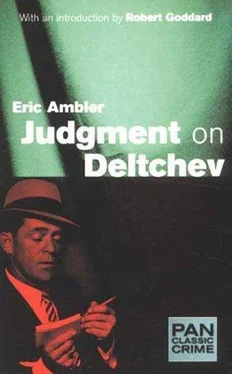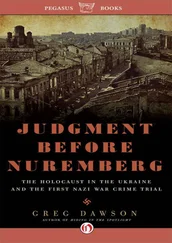Eric Ambler - Judgment on Deltchev
Здесь есть возможность читать онлайн «Eric Ambler - Judgment on Deltchev» весь текст электронной книги совершенно бесплатно (целиком полную версию без сокращений). В некоторых случаях можно слушать аудио, скачать через торрент в формате fb2 и присутствует краткое содержание. Год выпуска: 1977, ISBN: 1977, Издательство: Vintage, Жанр: Криминальный детектив, на английском языке. Описание произведения, (предисловие) а так же отзывы посетителей доступны на портале библиотеки ЛибКат.
- Название:Judgment on Deltchev
- Автор:
- Издательство:Vintage
- Жанр:
- Год:1977
- ISBN:9780307049971
- Рейтинг книги:4 / 5. Голосов: 1
-
Избранное:Добавить в избранное
- Отзывы:
-
Ваша оценка:
- 80
- 1
- 2
- 3
- 4
- 5
Judgment on Deltchev: краткое содержание, описание и аннотация
Предлагаем к чтению аннотацию, описание, краткое содержание или предисловие (зависит от того, что написал сам автор книги «Judgment on Deltchev»). Если вы не нашли необходимую информацию о книге — напишите в комментариях, мы постараемся отыскать её.
Judgment on Deltchev — читать онлайн бесплатно полную книгу (весь текст) целиком
Ниже представлен текст книги, разбитый по страницам. Система сохранения места последней прочитанной страницы, позволяет с удобством читать онлайн бесплатно книгу «Judgment on Deltchev», без необходимости каждый раз заново искать на чём Вы остановились. Поставьте закладку, и сможете в любой момент перейти на страницу, на которой закончили чтение.
Интервал:
Закладка:
It was a very unpleasant sensation. The brandy-engendered resolution with which I had set out seemed to drain suddenly away. I began to shiver uncontrollably and an icy, numbing kind of logic invaded the small corner of my conscious mind now whimpering with the effort required to keep on walking. What I was doing was incredibly foolish. Not three hours ago two men had tried to kill me in the street. I had been very lucky to escape. Now here I was in the streets again, giving them another chance. For obviously they must be waiting for me. Ruthless determination of the kind they possessed would be intensified by failure. They would not fail a second time.
Soon every shadow had become a man with a gun, every doorway the place of an ambush. I kept on simply because I was afraid to go back. I walked now simply because I was afraid to break into a run that might precipitate action. My legs ached with the strain. My shirt clung to my back. I had so completely lost my head that I went on fifty yards past my destination without seeing it. There was a frantic ten seconds on the corner of the Boulevard Sokolovsky while I got my bearings. Then I saw the apartment house from a familiar angle. I ran the fifty yards back.
It was a tall, narrow building with massive ferroconcrete balconies, from the sides of which rusty weather stains drooled down the walls. In the daylight these stains gave the place a tired, unhappy air — you wanted someone to wipe its face for it — but in the moonlight, they were hard shadows that made the balconies seem to project like freakish upper lips. The main entrance doors, ornate affairs of wrought iron and rolled glass, were still open, and the lobby beyond was dimly illuminated by a light from the concierge’s room.
As I stood for a moment or two recovering my breath, I looked back along the street. There were two or three empty cars parked in it, but they had been there already. Nobody had followed me. I went in and pressed the concierge’s bell. Nothing happened. After a minute or so, I went over to the lift. Beside it was a list of the tenants. Pashik was on the fourth floor. The lift did not work, of course. I found the stairs and walked up.
At the moment of deciding to see Pashik that night I had had a clear image of the sort of interview it would be. I had seen him already in bed and asleep when I arrived. In response to my insistent ringing he had at last appeared, a bleary, nightshirted figure (I had been sure he wore nightshirts), fetid and protesting. I had cut through his protests decisively. I had given him no time to build up his defences. I had pelted him with the facts I had discovered and watched his features grow pinched as he realized how much I knew. Then, at last, wearily he had shrugged. ‘Very well. Since you already know so much, Mr Foster, you had better hear the rest.’ And I had sat down to listen.
The reality was somewhat different.
The door to his apartment was at the end of a short passage near the main staircase landing. As I turned into the passage, I saw that the door was ajar and that there were lights in the apartment. I went along the passage and up to the door. Then, with my hand on the bell, I paused. Inside, someone was speaking on the telephone. Or listening rather; there was a series of grunts, then two or three words I did not understand. The voice, however, was not Pashik’s. I hesitated, then rang the bell.
The voice ceased abruptly. There was a movement from within. Then silence. Suddenly the door swung open and clattered gently against a picture on the wall behind it. For a moment the small lobby beyond looked empty. Then I saw. Between the doors of the two rooms facing me was a narrow strip of wall. On the wall was a mirror, and, reflected in it, the face of the man who had pushed the door open with his foot. It was Sibley.
He moved slowly out from the wall just inside the entrance and looked at me. There was a heavy bottle-glass ashtray in his hand. He put it down on the hall table and grinned.
‘Well, Foster dear,’ he said archly. ‘This is a nice surprise! A small world, I always say. Do you always say that? Of course you don’t! Come to see our smelly friend?’
‘Naturally. What are you doing here?’
He looked at me oddly. ‘I’ve come to see him too, and also naturally. Doesn’t seem to be about, though, does he? I’ve looked high and low.’
‘Who were you expecting to have to beat over the head with that ashtray?’
‘Somebody else who shouldn’t be here. Like me. You’re quite a logical visitor, of course. Been here before, I shouldn’t wonder.’
‘No.’
He grinned again. ‘I thought not. Come on in and make yourself at home. I was telephoning.’
‘Yes, I heard.’
‘Don’t speak the language though, do you?’
‘No.’
‘I thought not. This way.’
He went through the left-hand door. I hesitated and then followed.
It was a sitting room that had obviously been furnished by the owners of the building. There were built-in cupboards and bookcases and a built-in sofa. There were cube-like easy chairs, glass-topped circular tables, and an oatmeal-coloured rug. You could have seen the same sort of things in any other furnished apartment building in any other European city. The extraordinary thing about this room was the decoration of the walls.
They were covered, every square foot of them, with pages cut from American magazines and stuck on with Scotch tape. There were pictures of filmstars (all women), there were near-nude ‘studies’ of women who were not filmstars and there were artlessly erotic colour drawings of reclining seductresses in lace step-ins. All would have looked quite at home in the room of an adolescent youth. Yet that was the comprehensible part of the display; it was not remarkable that Pashik should have the emotional development of a sixteen-year-old boy. The startling thing was that for every Ann Sheridan, for every sandal-tying beach beauty, for every long-legged houri, there was a precisely arranged frame of advertisement pages. The nearest Betty Grable was surrounded by Buick, Frigidaire, Lux, and American Airlines, all in colour. A sun-tanned blonde glistening with sea water had Coca-Cola, US Steel, Dictaphone, and Lord Calvert whisky. A gauze-veiled brunette with a man’s bedroom slipper in her hand and a speculative eye was framed by Bell Telephones, Metropolitan Life Insurance, General Electric, and Jello. The baffling thing was that the selection and grouping of advertisements seemed quite unrelated to the pictures. There was no wit, no hint of social criticism, in the arrangements. Many of the advertisements were not particularly distinguished as such. It was fantastic.
Sibley had gone back to the telephone. He had said something into it, listened again, and then, with a last word, hung up. He flicked his fingers at the wall as if he were launching a paper pellet.
‘Lots of fun, isn’t it?’
‘Lots. How did you get in?’
‘The concierge has a pass key and is corrupt. Would you like a drink? There must be some about.’ He opened one of the cupboards and peered inside.
‘Do you know Pashik well?’ I said.
‘Would you believe me if I said yes?’
‘No.’
‘Then let’s say that I think I know a bit more about him than you do. Cigars but no drinks,’ he added, producing a box. ‘Cigar?’
‘No, thanks.’
‘No, it’s a drink you need. You’re not looking your usual cheerful self, Foster dear. A bit pinched round the gills and upset. Let’s try this one.’ He went to another cupboard.
‘I take it you’re not afraid of Pashik’s suddenly turning up and finding you here searching his room. That wouldn’t embarrass you?’
‘Not a bit.’
‘Was that why you came? Because you knew he wouldn’t be here?’
Читать дальшеИнтервал:
Закладка:
Похожие книги на «Judgment on Deltchev»
Представляем Вашему вниманию похожие книги на «Judgment on Deltchev» списком для выбора. Мы отобрали схожую по названию и смыслу литературу в надежде предоставить читателям больше вариантов отыскать новые, интересные, ещё непрочитанные произведения.
Обсуждение, отзывы о книге «Judgment on Deltchev» и просто собственные мнения читателей. Оставьте ваши комментарии, напишите, что Вы думаете о произведении, его смысле или главных героях. Укажите что конкретно понравилось, а что нет, и почему Вы так считаете.












